- Home
- Francine Rivers
A Voice in the Wind Page 21
A Voice in the Wind Read online
Page 21
Marcus moved into the doorway and saw them sitting close together. Hadassah sat straight-backed on the edge of a stool, hands folded in her lap. Claudius was more comfortable on his sofa, his gaze intent upon her face. Marcus leaned indolently against the frame, trying to keep a cool head against the hot rush of anger. “And if your neighbor is your enemy?” he said indolently.
Claudius glanced up in surprise. Obviously, he did not welcome the intrusion. Marcus didn’t care and returned his attention to Hadassah. She was standing, eyes downcast, awaiting her master’s dismissal.
“You may go, Hadassah,” Claudius said and stood.
Marcus didn’t move from the doorway and she couldn’t pass. He studied her from the top of her dark head down to her small sandaled feet. He waited for her to raise her eyes and look at him, but she didn’t.
“Come in and sit down, Marcus,” Claudius said, putting away his ink and quills and rolling up a scroll on his desk.
Marcus straightened slightly, and Hadassah moved by him. He heard the soft tread of her footsteps down the hall. “It always takes me a few days to adjust to the silence after Rome,” Claudius said, smiling at Marcus in commiseration.
Marcus entered the room. It wasn’t the silence that had kept him awake.
“May I offer you some wine?” Claudius said and poured a goblet of wine before Marcus answered. He held it out to him. Marcus took it and watched him pour another for himself. Claudius was relaxed, his eyes brighter than they had been all afternoon in Julia’s company. It would seem Hadassah was stimulating company.
“I’m sorry I interrupted something between you and my sister’s maid,” he said stiffly.
“No apology necessary,” Claudius said and reclined on a sofa. “We can continue tomorrow.” He made himself comfortable. “Did you wish to talk about your sister?”
“Your wife?”
Claudius smiled slightly. “When she so pleases,” he said ruefully. He took a sip of his wine and motioned for Marcus to sit. “If you want my permission to take her to one of the local ludi, you have it. I will give you a few names.”
“I’ll make the arrangements tomorrow,” Marcus said.
“Was that all that was on your mind, Marcus?” He felt the younger man’s tension, even sensed his anger, though he could not fathom the reason for it.
“All is well between you and Julia?” he said.
“Did she say it was not?” Claudius said in some surprise.
Marcus knew he was standing on sandy ground. This was Claudius Flaccus’ home, not his own. Julia was Claudius’ wife, Hadassah her slave. Marcus had no right to question another man’s treatment of his wife or how he used his slaves. “No,” he said slowly. “She told me she is content.” His eyes narrowed coldly. “Julia is far too innocent.”
Claudius studied him more closely. “What is really on your mind, Marcus?”
Marcus decided to be frank. “Your relationship with my sister’s maid.”
“Hadassah?” Claudius sat up and set his wine aside. “Your sister earned my undying gratitude when she sent her to me. She is the first Jew who has spoken freely about her religion. Most look upon us as heathens. Amusing, isn’t it? Every religion looks upon others as heathen, but there is a profound arrogance to the Jews’ monotheism. Hadassah, for example. She is a humble servant, devoted and obedient. Yet there is an uncompromising quality about her faith in her god.”
He stood and went to his scrolls. “Hadassah fascinates me. I’ve gained more knowledge about Jewish history and religious culture from her in the last two months than I’ve been able to glean in years. She knows a great deal about their Scripture, despite the fact that most Jewish women are excluded from studying their Torah. Her father apparently taught her. He must have been a freethinker. Listen to this.”
He rolled his scroll out and set a weight upon it. “‘My God, My God, why have You forsaken Me? Why are You so far from helping Me, and from the words of My groaning. O My God, I cry in the daytime, but You do not hear; and in the night season, and am not silent.’”
Claudius looked up. “Do you hear the anguish of it? She had tears in her eyes the evening she quoted the passages to me. They were not just poetic words to her.” He ran his finger down the columns of writing.
“She said the fall of Jerusalem was foretold because of the unrighteousness of her people. She believes her god has a hand in everything that happens on the earth.”
“Like Zeus.”
Claudius glanced up. “No. Not like Zeus. Her god is absolute, he doesn’t share his rule with myriad other gods and goddesses. She says he is unchanging. He does not think like a man. Wait a minute. I’ll read her own words about it.” He pulled out another scroll and spread it on the table, searching again.
“Here it is. ‘God is not a man, that He should lie, Nor a son of man, that He should repent. Has He said, and will He not do it? Or has He spoken, and will He not make it good?’” Claudius looked up, eyes alight with amusement. “She told me a funny tale along with that Scripture passage. It was about a king named Balak, who hired a prophet named Balaam to curse Israel. On his way to meet the king, Balaam’s donkey stopped on the road because an angel with a sword blocked the way.”
“An angel?” Marcus said blankly.
“A supernatural being that works for their god,” Claudius said quickly. “Hadassah said these beings have appeared to men all through history. Message carriers like Mercury. They are servants of her god.” He waved an end to his explanation. “Anyway, the prophet tried to beat the donkey into moving, but the donkey stood firm and finally spoke to him.” He laughed. “When the prophet reached the king, every time he tried to curse Israel, the curse came out a blessing.” He let the scroll go and rolled it up quickly, setting it in a pile with others. Marcus looked at them and imagined the hours of time with Hadassah they represented.
“Hadassah believes her god takes a personal interest in each one of us, whether we be Jew or not. She said that Jewish Scripture is the lamp that lights the path of her life.” He gestured to another scroll. “She claims it is impossible for her god to lie. When he makes a promise, he keeps it to the end of time. His loving-kindnesses never cease, and his compassion never fails.”
Marcus gave a sardonic laugh. “Titus told me more than a million Jews were killed in the destruction of Jerusalem, countless thousands crucified. If that’s the sort of kindness and compassion her god bestows upon his people, it is a wonder the Jews are not flooding the temples of Artemis and Apollo.”
“My own thoughts. We’ve been discussing that, also. She looks upon the destruction of Jerusalem as a just punishment upon Israel for their unfaithfulness. She says her god uses war and affliction and suffering as a means of drawing his people back again. An interesting concept, isn’t it? Affliction as a means of protecting and hedging them into their faith! She said something else that was intriguing. Apparently a man named Jesus of Nazareth prophesied the destruction of Jerusalem. His own people crucified him, but she says all the Jewish prophets came to a bad end. Some of the Jews worship this Jesus as the incarnate son of their god. Christians, they call themselves. It’s a Jewish cult.”
“You will remember Nero tried to annihilate them after the burning of Rome,” Marcus said.
“Yes. One of their beliefs is that the world will come to a fiery end, and this Christ will return with an army and create his own empire on earth.”
Marcus was little interested in Claudius’ comparative study of religious cults of the Empire. “Then am I correct in assuming you are not sleeping with her?”
Claudius looked up from his scrolls. “With Julia?”
“Hadassah.”
“Hadassah? She is but a child.”
“She’s the same age as my sister,” Marcus said coolly.
Claudius blushed. It was a long, painful moment before he answered slowly and with grave dignity. “Your sister is my wife, Marcus. You have my promise I will be as faithful to her as I was to Helena.”
Marcus seldom felt embarrassment, but he felt it wash over him at the look on Claudius’ face. Not only had he hurt him, he had opened an old wound. “I was concerned for my sister,” he said, trying to excuse his unpardonable rudeness. “You have my apologies if I have insulted you.”
It was another long, still moment before Claudius spoke. “Apology accepted,” he said.
Marcus finished his wine and set the goblet on the table. “I bid you a good night, Claudius,” he said quietly and left the library.
“He’s gone to Rome!” Julia said, tossing her shawl aside and sinking down onto her lounge despondently.
“Your brother, my lady?” Hadassah said, gathering up the shawl and carefully folding it.
“No. The gladiator we saw on the road five weeks ago. I found out his name is Atretes. He killed the lanista at the ludus and was sold to a man named Bato, who trains the emperor’s gladiators. He was taken to Rome a month ago.” She looked away, her pretty face lined with bitterness. “And I’m stuck here in Capua. Octavia will see him fight before I do. She’ll probably drink wine with him at one of the feasts before the games.” Her eyes filled with tears of self-pity.
Though Hadassah schooled her expression to show nothing of what she felt, she was relieved the gladiator was gone. Perhaps now Julia would put him from her mind and turn to her husband. Claudius wouldn’t disappoint her. He was kind and intelligent, sensitive and tender. Knowing Julia’s feelings, Claudius wouldn’t press her for his marital rights. If Julia just gave herself time, she could learn to love him for the man he was.
Hadassah prayed unceasingly for both of them.
She spent long hours in the library with Claudius. It saddened her to do so, for he was a lonely man. His pursuit of knowledge occupied, but didn’t satisfy, his mind. She tried to offer God’s knowledge to him through the Scriptures her father had taught her. She wanted to tell him of Christ. But how could she? If he didn’t believe in a Creator, man’s fall, or the necessity for redemption, he would reject the Lord.
Claudius didn’t seem to grasp the importance of anything she told him. As with Julia, lessons of truth were merely stories to while away the time, something for him to write down on one of his scrolls. The holy God was stacked on a pile among myriad gods throughout the Empire, just one more interesting cult or religion of Rome.
It grieved Hadassah. Claudius was lost, and she was failing him as she was failing Julia. She was failing the Lord. Her father would have known what to say to open their eyes and ears to Jesus.
Something else bothered Hadassah as greatly as the futility of Claudius’ quest for worldly knowledge. Julia withdrew from her husband more and more. And now, rather than reach out to his wife, Claudius continued to summon Hadassah. At first, it had only been in his library during the evening hours after Julia no longer needed her. And they always discussed Jewish culture and religion. But during the last week, Claudius had summoned her twice in midday when she was serving Julia and Marcus. Today he summoned her to the gardens as soon as Marcus had taken Julia from the villa for a ride.
Persis came for her. He managed the household slaves and was devoted to Claudius—and he despised Julia’s treatment of his master.
“You have given my lord reason to live again,” Persis said as he led her to Claudius. “We all thought he would commit suicide when he lost the Lady Helena. He married Lady Julia because she looks like her. It was a cruel trick of the gods.” He paused and put his hand on her arm. “Offering you to the master was the single selfless act the Lady Julia has done since coming here. You’ve been good for him.” He nodded his head toward the open doorway. “He awaits you in the gardens.”
Hadassah was mortified with shame. She knew that the household slaves who came into contact with Julia disliked her. Did they hope Claudius would reject his wife in favor of a mere slave? May it not be so! She went to Claudius reluctantly, embarrassed to be in his presence in the open.
Claudius talked about gladiators. Although, like all Romans, he had attended the games, witnessing a man’s death was repugnant to him. Julia’s fascination for it disturbed him. “Did she attend the games often in Rome?”
“No, my lord. Her brother took her a few times.”
“Did Decimus encourage it?”
Hadassah blushed.
Claudius smiled down at her. “You are not breaking a sacred trust by telling me something of my wife, Hadassah. It will go no further than my ears.”
“The master did not know,” she said.
“I thought not, though I imagine he suspected it. It’s difficult to stop Julia from doing as she pleases.” He asked if the Jews had any great warriors. Hadassah told him of Joshua taking Jericho and putting the fear of God into the Canaanites. She told him how King Saul’s son Jonathan and his armor bearer had climbed a hill and routed a garrison of Philistines, thus turning the tide of an entire war. She told him the story of Samson.
Claudius gave a rueful laugh. “This Samson of yours appears to have had a fatal weakness for unfaithful women. First, a betraying wife, then a harlot in Gaza, and finally the beautiful, but cunning Delilah.” He shook his head as he walked along the pathway with her, his hands clasped behind his back. “A pretty face and a beautiful body blind a man more quickly than any poker through the eyes.” He sighed. “Are all men slaves to their own passions, Hadassah? Are all men fools when it comes to women?” He looked straight ahead, his thoughts distant. “. . . As I was a fool when I married Julia?”
Distressed by his words and mood, Hadassah stopped in the pathway and, without thinking, put her hand on his arm. He seemed so despondent, so hopeless. She wanted to give comfort. “Do not think so, my lord. It was not a mistake to marry my lady.” She searched frantically for a way to explain and excuse her mistress’s faults. “Julia is inexperienced. Give her time.”
Claudius smiled sadly. “Yes, she is inexperienced. She has never suffered hardship. She has never been hungry or in want of anything. She has never had anything taken from her.” He spoke without rancor. “But time will alter nothing.”
“All things work for good, my lord.”
“Good has come from my marriage to her.” He touched her cheek gently. “I have you.” He smiled ruefully as hot color poured into her cheeks and she looked down. “Don’t be distressed, my dear. After the first few weeks of marriage to Julia, I saw my life stretched out ahead of me like a wasteland. Now, as long as I have you, I can bear all things.”
Claudius tipped her chin and gazed down into her tear-filled eyes for a long moment, studying her tenderly. “Passion lasts but a moment, compassion a lifetime,” he said quietly. “A man needs a friend, Hadassah. Someone he can talk to and confide in.” He bent and kissed her forehead, as her father used to do. Straightening, he slid his hands down her arms and grasped her hands firmly. “I am grateful.” He kissed her knuckles and released her, then left her alone in the garden. She sat on a bench and wept.
Now, watching Julia’s sullen expression as she stared out the window into the garden, annoyed because a gladiator had gone to Rome, Hadassah wondered again what she could do to encourage and renew Claudius’ love for his young wife. It wasn’t right that he was turning to her.
“The master is in his library, my lady. You would enjoy his company,” Hadassah said gently.
Julia gave her a brittle look. “Claudius bores me to death. Better that he caress his scrolls than me.” She sighed and turned away again, looking more like a vulnerable child than a petulant, selfish young wife. “I’m tired and my throat is parched.”
Hadassah poured her a goblet of wine. “Your feet are dusty, my lady. Would you like me to wash them?” Julia gave an indifferent nod, and Hadassah went for the basin.
Marcus entered the room. Hadassah’s stomach quivered oddly when he greeted Julia. She felt her pulse quicken as he came closer; it was as though his mere presence made her skin tingle and her blood grow warm. She kept her eyes lowered as she knelt and poured water over Julia’s
dusty feet. She poured scented oil into her palm and began to knead Julia’s feet gently as they talked.
“Did you enjoy your visit to the ludus, little sister? Or was it spoiled by the absence of your German?” He was amused, not reprimanding.
“It was fine. The contest between the retiarius and the Thracian was entertaining.”
“Don’t sound so excited,” he said drolly, watching Hadassah massage his sister’s feet. Her hands seemed gentle, but firm. “I was talking with Claudius. He has quite a study going on religions in the Empire.”
“I’m not the least interested in what Claudius is doing,” Julia said, annoyed at the mention of her husband.
“It would be wise to be interested,” Marcus said flatly, and Hadassah felt his gaze on the back of her head so intently it was as though he were touching her. She had been aware of his glance more than once during his visit, dark and compelling . . . accusing.
“Claudius is free to do as he pleases,” Julia said. “By the gods, that I could be as free as a man.” She pulled her feet back abruptly, splashing water into Hadassah’s face. “Dry my feet,” she commanded angrily. “I’m going to walk in the gardens.” She gave her brother a sullen look. “Alone.”
“As your heart desires, little sister,” Marcus said, mockingly. “Such a sweet disposition deserves solitude.”
As Julia left the room, Hadassah gathered up the damp cloth, the vial of scented oil, and the basin of dirty water. She moved to leave, but Marcus blocked her way.
“Don’t be in such a hurry. My feet are dirty, too,” he said. “Empty the basin in that potted plant over there and come back here.”
Hadassah did as she was ordered. As she came back, he sat down on the couch. She knelt at his feet, her hands trembling as she removed his sandals. She took the half-full pitcher and almost dropped it. Gripping the handle tightly, she poured water over his feet and set it aside again. She could feel his attention fixed on her as she poured oil and rubbed her palms together before beginning to massage his feet. He made a deep sound in his throat that caused a burst of strange sensations in the pit of her stomach.

 An Echo in the Darkness
An Echo in the Darkness A Lineage of Grace
A Lineage of Grace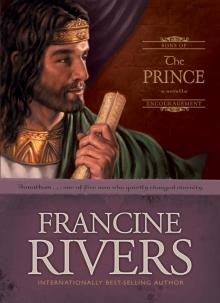 The Prince: Jonathan
The Prince: Jonathan Bridge to Haven
Bridge to Haven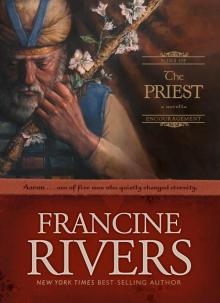 The Priest: Aaron
The Priest: Aaron Her Mother's Hope
Her Mother's Hope Redeeming Love
Redeeming Love The Scarlet Thread
The Scarlet Thread The Masterpiece
The Masterpiece The Last Sin Eater
The Last Sin Eater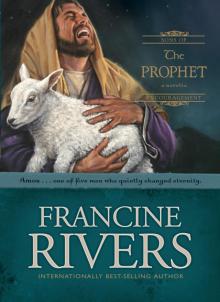 The Prophet: Amos
The Prophet: Amos As Sure as the Dawn
As Sure as the Dawn Her Daughter's Dream
Her Daughter's Dream A Voice in the Wind
A Voice in the Wind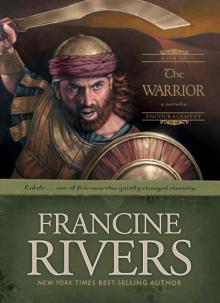 The Warrior: Caleb
The Warrior: Caleb The Scribe: Silas
The Scribe: Silas And the Shofar Blew
And the Shofar Blew The Atonement Child
The Atonement Child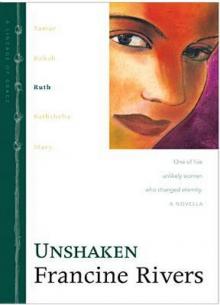 Unshaken_Ruth
Unshaken_Ruth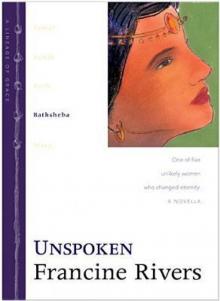 Unspoken_Bathsheba
Unspoken_Bathsheba The Scribe
The Scribe Sons of Encouragement
Sons of Encouragement The Shoe Box
The Shoe Box Sycamore Hill
Sycamore Hill Unafraid_Mary
Unafraid_Mary Marta's Legacy Collection
Marta's Legacy Collection